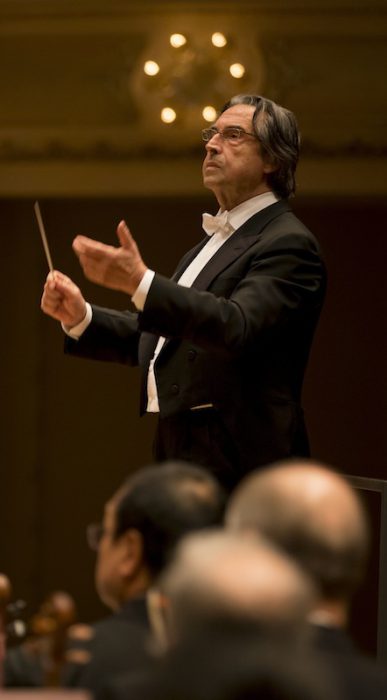Chicago Symphony principals knock it out of the park in a thrillingly virtuosic “Sheherazade”

Riccardo Muti conducted the Chicago Symphony Orchestra in music of Mozart and Rimsky-Korsakov Thursday night at Symphony Center. File photo: Todd Rosenberg
Often there is a tendency for classical audiences—and, to be honest, classical music critics—to concentrate more on the personage waving the stick on the podium than the 80 people or more performing the music onstage. Yes, the conductor is important and even essential to a polished and unified performance (some cynics in orchestra ranks will disagree). But nothing happens without the individual artistry and combined talent of those dozens of musicians converting thousands of little dots and squiggles into glorious sound.
It’s taking nothing away from Riccardo Muti’s exemplary conducting Thursday night to say that one walked out of the performance of Sheherazade floored anew by the bounteous musical talent that abides within the current roster of the Chicago Symphony Orchestra.
In his most celebrated work, Rimsky-Korsakov paints a sprawling musical portrait of the Arabian Nights, with Sheherazade weaving four tales in a sumptuous, dazzlingly scored canvas. While the stories are reflected within a more broadly impressionistic fashion than in specific storylines, Sheherazade remains unique in its arching “Oriental” melodies and epic musical tapestry.
Muti led a rich, full-blooded performance of Sheherazade, a work that he and the CSO will take on the road later this season. In the big moments, the playing was daunting in its sonic punch, as with the violent intensity of the finale’s shipwreck, all five hard-working percussionists brilliantly set against the staccato brass motif. The score’s perfumed delicacy and exotic languor were less consistently manifest, though Muti drew sumptuously warm-hearted string playing in the “The Young Prince and the Young Princess.”
Sheherazade is arguably the greatest concerto for orchestra ever written. From the initial violin solo of the Sultana telling her first tale, nearly every page offers prime, over-the-plate opportunities for every front-desk player to swing for the fences.
And knock it out of the park they did. Even more than what one hears on a weekly basis, the individual playing was simply astonishing Thursday, with each successive solo producing the same mounting excitement and sense of anticipation as one experiences watching a sporting event played at the highest level.
The initial violin solo is crucial to drawing an audience into this kaleidoscopic work. Playing with silken, sweet tone, concertmaster Robert Chen succeeded in making Sheherazade’s familiar theme sound remarkably fresh and wholly bewitching throughout—chaste in tone yet sensual and insinuating, with a melancholy, valedictory expression in his final solo.
The CSO woodwinds covered themselves in glory, notably Stephen Williamson’s rollicking, personality-plus clarinet solos and Stefán Ragnar Höskuldsson’s pure and elegant flute work. Bassoonist Keith Buncke brought a quirkiness and jazz-like audacity to his playing that made one hang on every phrase.
The orchestra’s new principal oboe William Welter was not quite in the same league with his colleagues. Yet the young Curtis graduate acquitted himself more impressively than in his first week on the job, playing with greater presence and projection, and blending cohesively with the winds in ensemble sections.
Sitting in as guest principal viola for the second week in a row, Eric Nowlin–principal of the Detroit Symphony Orchestra—looked and sounded very much at home. Guest trumpet Esteban Batallán, principal of the Granada City Orchestra in Spain, played well but lacked that last bit of clarion brilliance.
The first half of the evening was devoted to Mozart.
A Muti specialty from his earliest podium days, Mozart’s music has been a consistent touchstone in the conductor’s Chicago tenure, and so it proved again with the performance of the Symphony No. 40.
While Muti favors a big-band approach with ample strings, his Viennese style is so natural and idiomatic that the music-making never feels heavy or out of scale. Taken at a fleet tempo, the celebrated opening theme went with driving urgency while held on a tight rein, with a seamless segue into the lilting second melody. Likewise, the jabbing accents and nervous insistence of the finale’s main motif was fluently contrasted with the lyrical theme.
The partnership of Muti and the orchestra was at its finest in the Andante. Beautifully rendered with creamy string tone and a supple ease in the melodic lift, the playing embodied the music’s warmth and gracious qualities, with a lurking tension beneath the Rococo surface.
The evening led off with the Overture to Don Giovanni—amazingly not played by the CSO downtown in 22 years. Here too Muti took a weighty approach yet one just as tightly concentrated. The whipcrack attacks and chromatic thrusts emphasized the grim drama to come more than the lightness and humor of the Allegro.
The program will be repeated 8 p.m. Saturday. cso.org; 312-294-3000.